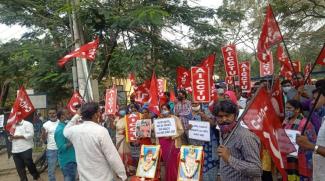Indian Telephone Industries A Report of the Fact Finding Team
[An Abridged Version of the Fact Finding Team Report on the Mistreatment of ITI Contract Workers—Almost Half of Whom are Dalits—on the 100th Day of their Struggle. Bengaluru, 10th March 2022.]
One Hundred Days of Struggle!
On 1st December 2021, 80 workers of India’s first Public Sector Undertaking (PSU), M/s Indian Telephone Industries (ITI) Limited, based in Bengaluru, were terminated with little justification. Despite having worked for between 3 to 35 years, workers are guised as “contract workers.”
The retrenchment of the workers is only one part of a longer history of labour abuse at ITI. In recent times, as with all PSUs, ITI contract workers have been rendered increasingly precarious: they are punished for unionising with de-promotions and humiliations, not to mention abrupt terminations.
The ITI workers’ struggle entered its 100th day on 10th March 2022. Coinciding with the 100th day, a fact-finding team of concerned citizens released a 25-page report summarising the abuses faced by the retrenched workers. “We feel that the struggle of the ITI workers in the face of such adversity is an ode to resilience and claims making for constitutional rights, fairness, inclusion, and citizenship. Industrial workers’ struggles and farmers’ struggles cannot be disconnected: they are both part of a broader political-economic trend that is concentrating wealth and power upwards in the hands of elite corporate management, both public and private,” say the report authors Akash Bhattacharya, Juhi Tyagi, Malini Ranganathan, Rajendran Narayanan, and Sushmita Pati.
Despite providing services during the first covid wave in 2020, ITI downgraded contract workers from “skilled” to “unskilled” soon after, based purely on their level of education, not experience. As one contract worker put it, “suddenly I became unskilled [from skilled] …In a month, I was making about 5,000 rupees less than before. We thought we have been working here for so long, it is okay. We realized only later that we have been working like slaves and not even asking for what they are supposed to give us.” Coded discrimination, disproportionately affecting women and people from marginalised castes and classes, is a key feature of the contract labour system. Of the 80 workers who were terminated, nearly half are from Dalit backgrounds and a large number are women.
Workers Demands
The report upholds the demands of the workers – who came together to form the Karnataka General Labour Union (KGLU), affiliated to the All-India Central Council of Trade Unions (AICCTU). The demands are as follows: to be immediately reinstated; to be allowed to unionise without fear of retaliation; to receive decent living wages and benefits, including maternity benefits; and to be treated with the dignity and respect they deserve as core workers of the company and as called for by the law.
The Regional Labour Commissioner (Central) had deemed ITI’s actions as a violation of the Industrial Disputes Act and has insisted that the workers be reinstated forthwith. Despite facing a suite of labour rights cases, ITI refused to comply. The report authors, who have also communicated the facts at hand to senior government representatives in New Delhi and Karnataka, strongly condemned the unlawful activities of ITI and demanded penal action against the PSU.
In the light of the current political and economic circumstances in our country, the authors of the report believe that ITI workers’ struggle has the potential to become a watershed movement in Indian workers struggle for their rights. The workers’ demands therefore assume a great significance.
While the pandemic disproportionately impacted the casual workforce, the ITI workers’ retrenchment demonstrates the precarity of the RWS (Regular Wage Salaried) informal workers even in a well-established public sector unit. Indeed, analysis based on independent surveys suggest that even salaried workers have been forced to resort to self-employment or casual work. These circumstances add urgency to the ITI workers’ demands and underscores the significance of their struggle.
The authors of the report believe that it is crucial to think not only about ITI workers, but also the Swiggy and Zomato delivery partners, Anganwadi workers, even software professionals who faced salary cuts and lost jobs due to the pandemic. They continue to suffer and also protest thereafter, as separate entities, but we need to see them all as part of the same continuum of exploitative working conditions. Contractual employment, precarity of livelihoods, indignity of labour, and the criminalization of collective bargaining are generalized phenomena being encountered by workers these days.
Besides, the current power structure, heavily tilted towards corporate welfare, religious violence and conservatism, looks to crush all dissent, and keep the working people socially and economically vulnerable. The dilution of labour laws is a useful case in point. Powerful workers’ struggles can go a long way in challenging the forces of status quoism. Hence the struggle of the ITI workers is not only theirs, but ours too, the report states.

